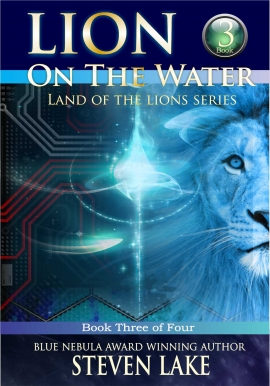Lion on the Water
 |
|
| Title: | Lion on the Water |
| Cover Artist: | Don Semora |
| Genre: | Scifi/Fantasy |
| Series: | Land of the Lions |
| Publication Date: | September 2012 |
| Media Types: | Ebook |
| ISBN: | 978-1476030852 (ebook) |
| Preceded By: | Lion of the Earth |
| Followed By: | Lion and the Fire |
Lion on the Water is the third book in the Land of the Lions novel series and takes Tgegani, the Yigzan and many others back to the very roots of their existence, and to the foundation of their society. They are also taken on a powerful, exciting adventure to save both their past, and their future.
Summary
The book opens with a quick prologue focused in the distant past that blows the cover off the idea that the three races of Braisail are unique to the planet, but in reality have much deeper origins of the intergalactic variety. The story then switches back to the present where Ibara, one of Tgegani's family, is working at an archeological dig that he's overseeing when an accident happens. But this incident instead reveals a secret that's been hidden below the ancient city of Parlahbradel for many, many centuries. Surprised at what he finds, he calls Breakman and Tgegani to show them. When the two arrive, they're shocked at what they see, causing the mystery of how these items cam to be to grow deeper. However, before they can get any further they, along with Sine, Ver-mach and Ick-pok are all drawn through time to a period of history over a thousand years earlier. However, before they can determine what's happened, they're snatched up to an Ahbranai starship, along with Psial and Yazik, two Ahbranai scientists who have been secretly working on the planet studying the people of a long lost colony who had settled there several centuries earlier, and given up their advanced technology and previous way of life to live a simplistic, agrarian life equivalent to the late bronze age.